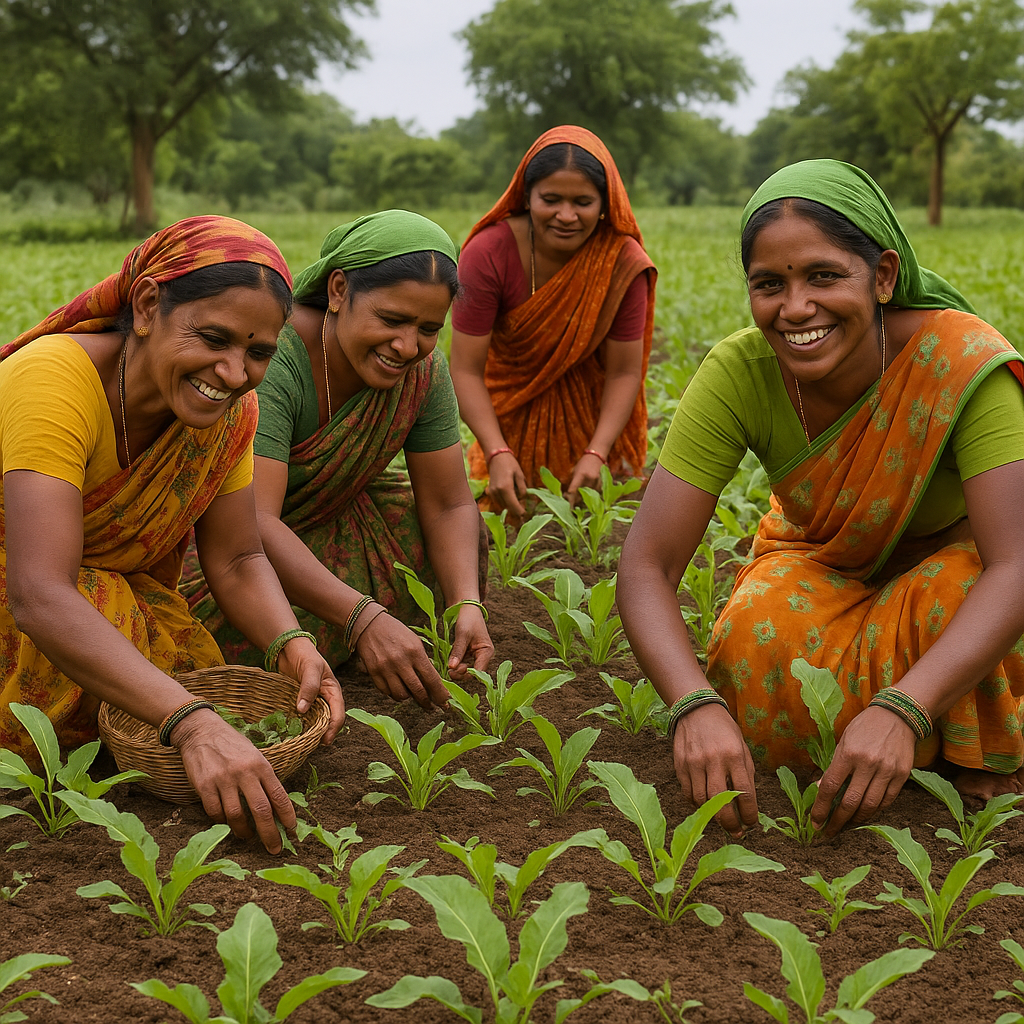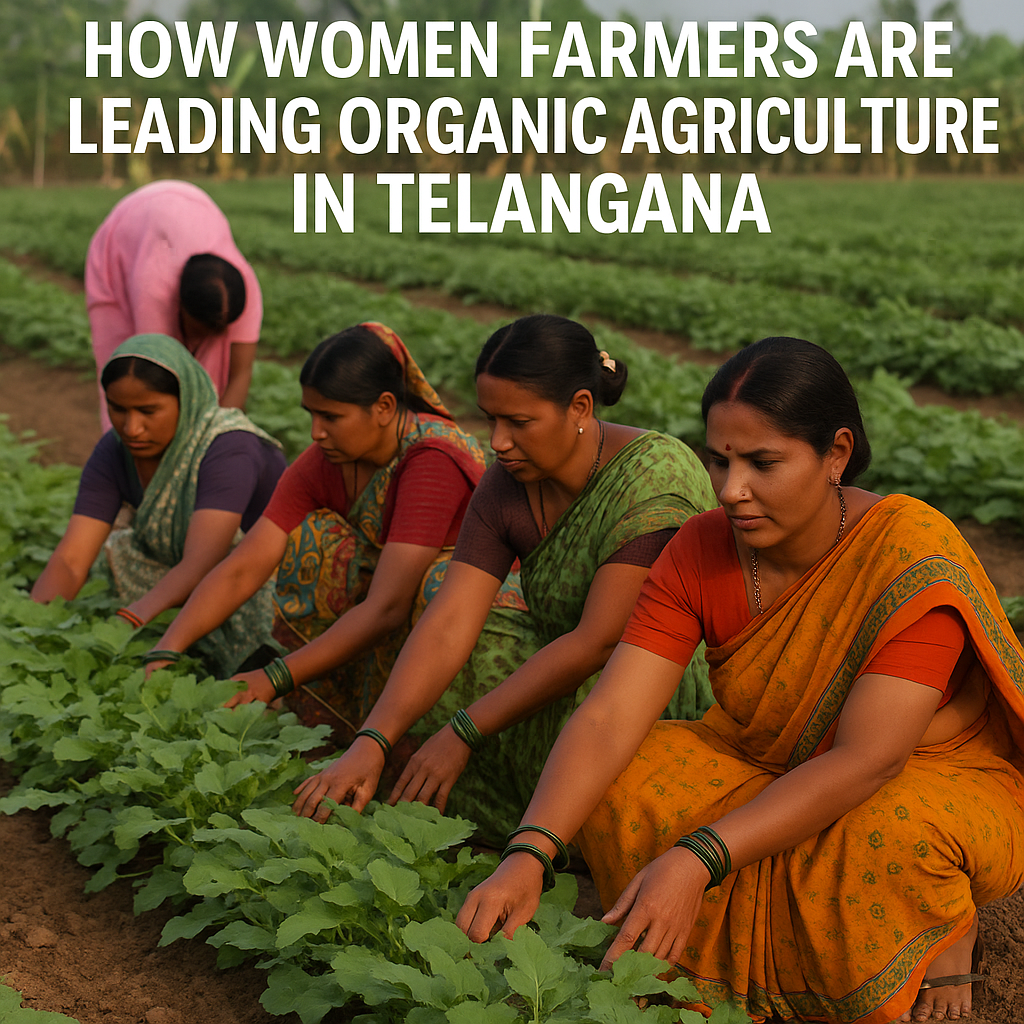
How Women Farmers are Leading Organic Agriculture
Empowering Change from the Soil Up
How Women Farmers are Leading Organic Agriculture
No-1 women-formers-are-leading-organic-agriculture In India’s vast farmlands, women are stepping into the spotlight. They are not only tilling soil but also shaping a revolution—one that emphasizes health, sustainability, and tradition. Organic farming has found its strongest allies in these women.
The Rural Reality and Organic Potential
No-1 women-formers-are-leading-organic-agriculture Across Indian villages, women have always contributed to farming, but their roles were often overlooked. Now, with organic agriculture gaining ground, women are emerging as leaders. They bring traditional wisdom and community spirit into a space once dominated by chemical practices.
Why Women Are Natural Leaders in Organic Farming
Deep knowledge of seasonal cycles and soil patterns
Focus on food security and family well-being
Greater willingness to adopt sustainable practices
These qualities make women ideal champions of organic agriculture. Their commitment fosters long-term benefits for land, community, and economy.
Training and Grassroots Movement
Across India, the movement toward organic farming is gaining momentum, and the No-1 women-formers-are-leading-organic-agriculture revolution is clearly visible in Telangana. Organizations and NGOs have recognized the transformative power of women in sustainable agriculture. One notable example is the Deccan Development Society (DDS), which has trained hundreds of rural women to take the lead in organic practices. These women farmers are not only growing food — they are preserving seeds, practicing crop rotation, and creating their own compost using natural methods. This holistic approach ensures long-term soil health and food security.
The No-1 women-formers-are-leading-organic-agriculture movement is more than just a farming initiative; it is a social change. It empowers women to make key decisions about what crops to grow, how to manage pests naturally, and how to share knowledge within their communities. As they master these eco-friendly techniques, their confidence grows, and so does their influence.
Training from DDS and similar organizations provides women with hands-on skills that translate into real independence. These women are now recognized as local experts and agricultural leaders. The No-1 women-formers-are-leading-organic-agriculture trend is inspiring other states to adopt similar models of empowerment.
With every passing season, the impact of these initiatives becomes more visible. Villages are becoming self-reliant, producing clean, chemical-free food while protecting their environment. It’s clear that the No-1 women-formers-are-leading-organic-agriculture path is paving the way for a greener and more inclusive future.
Case Study: Telangana’s Millet Mission
In Zaheerabad, women-led sanghams are growing traditional millets organically. They’ve restored barren lands using indigenous seeds and biodiverse cropping methods. Their model has become a blueprint for sustainable agriculture across India.
Daily Practices That Support Sustainability
Women farmers have adopted the following practices:
Use of cow dung and compost instead of synthetic fertilizers
Intercropping to maintain soil health
Pest control through neem oil and chilli-garlic sprays
These daily habits bring big ecological and economic benefits.
A Look at the Impact: Before vs After
| Indicator | Before Organic Farming | After Women-led Organic Farming |
|---|---|---|
| Soil Fertility | Degrading | Restored through composting |
| Water Retention | Poor | Improved via mulching |
| Crop Diversity | Limited | Enhanced with native crops |
| Farmer Health | Declining | Improved due to no chemical use |
| Income from Crops | Unstable | More stable with direct market access |
YouTube Documentary for Deeper Insight
Learn more through this real-life story: Watch the documentary.
Overcoming Social and Financial Barriers
Despite their contributions, women face challenges:
Limited land ownership
Lack of formal recognition
Restricted access to government schemes
However, support from local cooperatives and training programs is gradually breaking these barriers.
How Women Farmers Are Leading Organic Agriculture with Seed Banks
Women-led seed banks are key to agricultural revival. They save, trade, and distribute indigenous seeds—helping reduce dependency on costly hybrids. This promotes biodiversity and seed sovereignty within rural communities.
Soil Health: A Woman’s Priority
No-1 women-formers-are-leading-organic-agriculture movements across India, especially in rural regions, by taking control of seed preservation. Women-led seed banks have become essential to the revival of traditional farming systems. These women save, trade, and distribute indigenous seeds—reducing dependency on costly hybrid varieties. As a result, they protect local crop diversity and ensure sustainability.
The No-1 women-formers-are-leading-organic-agriculture initiative empowers women to become custodians of native seeds. With their efforts, rural communities gain access to high-quality, chemical-free seeds suited to local climates. This helps reduce input costs and increases farmers’ resilience to changing weather conditions.
By building and maintaining community seed banks, the No-1 women-formers-are-leading-organic-agriculture drive supports seed sovereignty. Women share their knowledge about seed treatment, preservation techniques, and seasonal planning. Their leadership helps revive forgotten crops that are rich in nutrition and well-adapted to Indian soil.
In Telangana and beyond, the No-1 women-formers-are-leading-organic-agriculture model shows that empowering women in agriculture leads to long-term benefits. Seed banks become centers of learning, sustainability, and hope for future generations.
Clearly, the No-1 women-formers-are-leading-organic-agriculture approach is not only preserving biodiversity but also strengthening community bonds and rural economies.
Climate Change? Women Know What to Do
With unpredictable weather patterns, women adapt by:
Growing drought-resistant millets
Using water-saving techniques like drip irrigation
Following lunar cycles for sowing and harvesting
Their adaptive practices offer resilience in uncertain climates.
Collective Farming and Shared Success
Across many regions in India, the No-1 women-formers-are-leading-organic-agriculture movement is gaining strength through collective farming. Women are coming together to lease land as a group, pooling resources like tools and labor, and sharing both risks and profits. This cooperative model is transforming not just farming practices, but also the lives of the women involved.
As part of the No-1 women-formers-are-leading-organic-agriculture trend, these collectives allow women to support one another emotionally and economically. The shared responsibilities build solidarity and reduce individual burdens, creating a sustainable and inclusive farming ecosystem.
The No-1 women-formers-are-leading-organic-agriculture approach to collective farming is especially effective in boosting productivity. Women plan and rotate organic crops strategically, use natural fertilizers, and manage pests without chemicals—leading to healthier yields and lower costs.
Beyond financial gains, the No-1 women-formers-are-leading-organic-agriculture initiative strengthens rural communities. Women gain leadership experience, improve negotiation skills, and become active voices in local agriculture decisions.
Clearly, the No-1 women-formers-are-leading-organic-agriculture model of collective farming is not just a trend—it’s a proven method for empowering women, preserving the environment, and creating lasting change in Indian agriculture.
Internal Support: Reach Out for Guidance
If you’re a farmer wanting to join this movement or need guidance, visit our Contact Us page. Get connected with mentors and organizations that support organic women-led initiatives.
Organic Farming Is Not Just About Crops
Women focus on the bigger picture:
Nutrition-rich food for families
Community food security
Eco-friendly lifestyles
Their holistic view brings balance between nature, economy, and society.
Role of Technology in Women-led Organic Agriculture
Mobile apps, WhatsApp groups, and video tutorials are empowering women farmers to learn and trade. Access to knowledge has made them confident decision-makers.
Women Farmers and Market Access
Direct-to-consumer markets, organic exhibitions, and farm stalls are helping women sell their produce at fair prices. Middlemen are eliminated, increasing profits.
What Can You Learn from Them?
Practice sustainable soil management
Adopt bio-pesticides over chemicals
Start a community seed-saving initiative
These steps can transform your farm and your future.
Inspiring Stories from Across India
Lakshmiamma, a seed saver from Medak, preserved 90 varieties
Kaveri Devi in Karnataka grows over 30 crops on one acre
Rukmini Bai in Maharashtra trains 50+ women annually
These stories fuel a growing movement.
Men Supporting Women-Led Organic Agriculture
Fathers, brothers, and husbands are recognizing the value women bring to farming. Their support strengthens the movement and leads to more inclusive development.
Government and NGO Partnerships
Several government schemes now promote women in agriculture:
Mahila Kisan Sashaktikaran Pariyojana (MKSP)
Organic Value Chain Development Scheme (OVCD)
NGOs help bridge the gap by providing training, certification, and market access.
Looking Ahead: The Next Generation of Female Farmers
Young girls in farming families now see agriculture as a dignified profession. Organic farming, supported by women role models, is creating a future where farming is aspirational.
Recap: Key Ways Women Are Transforming Agriculture
Embracing sustainable practices
Creating economic independence
Preserving traditional knowledge
Empowering rural communities
In recent years, No-1 women-formers-are-leading-organic-agriculture has become an inspiring story of empowerment, sustainability, and transformation. Across rural India, women are taking charge of their farms, shifting away from chemical-based practices, and embracing organic methods that are both eco-friendly and economically viable.
The rise of female leadership in this green revolution highlights No-1 women-formers-are-leading-organic-agriculture by reviving traditional farming knowledge, promoting biodiversity, and ensuring healthier food for their families and communities. From Andhra Pradesh to Maharashtra, women’s self-help groups (SHGs) are working together, managing land organically, and training others in sustainable techniques.
A major reason No-1 women-formers-are-leading-organic-agriculture is gaining attention is due to their deep-rooted connection with the land. Women have always been key contributors to agriculture, but organic farming gives them autonomy, recognition, and income. They are cultivating millets, pulses, and vegetables using composting, crop rotation, and natural pest control methods — proving that farming can be productive without chemicals.
Government schemes and NGOs are now recognizing No-1 women-formers-are-leading-organic-agriculture and supporting them with training, certification, and market access. Their success stories are spreading through farmer meets, social media, and exhibitions, encouraging more rural women to switch to organic farming.
When we look closely at No-1 women-formers-are-leading-organic-agriculture. it becomes clear that this movement is not just about farming — it’s about building healthier families, stronger communities, and a sustainable future. With dedication and knowledge, these women are sowing seeds of change for the entire nation.
Indeed, No-1 women-formers-are-leading-organic-agriculture is a shining example of grassroots leadership creating a greener tomorrow.
Frequently Asked Questions: How Women Farmers are Leading Organic Agriculture in Telangana
What does it mean when we say how women farmers are leading organic agriculture in Telangana?
It means that women in Telangana are taking leadership roles in switching from chemical-based farming to sustainable, organic methods. They are forming self-help groups, managing organic farms, and setting examples for eco-friendly agriculture.
Why are women playing a major role in organic farming in Telangana?
Women have traditionally been involved in farming activities. Now, through training and awareness, they’re using organic techniques like composting and natural pest control, proving how women farmers are leading organic agriculture in Telangana effectively.
What crops are mostly grown by women farmers in organic agriculture in Telangana?
Women organic farmers in Telangana grow millets, pulses, leafy vegetables, turmeric, and cotton. These chemical-free crops are in demand, showing how women farmers are leading organic agriculture in Telangana with practical success
Are there government schemes that support how women farmers are leading organic agriculture in Telangana?
Yes. Schemes like PKVY (Paramparagat Krishi Vikas Yojana) and state-level organic missions support women farmers with training, seeds, and marketing help — boosting how women farmers are leading organic agriculture in Telangana.
How can others support women farmers in Telangana who are practicing organic farming?
Buying directly from local organic markets, joining CSA (Community Supported Agriculture) models, and spreading awareness are great ways to support how women farmers are leading organic agriculture in Telangana

